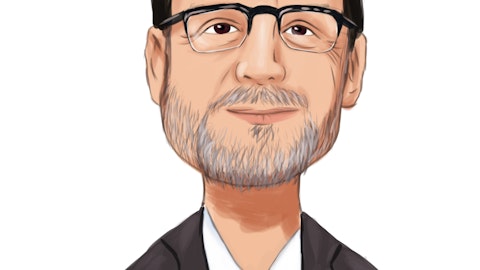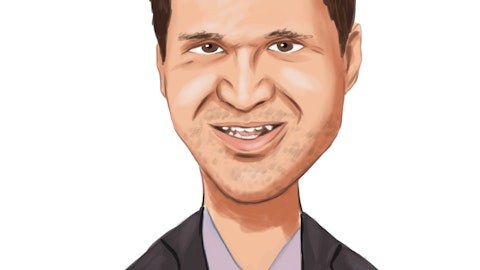Robert Price: Okay. So this is a very, very important question and a very important matter for the company. So what we have been — our approach is going to discuss this with the Board and take our time to be sure we come up with a good answer, because the Board needs to be involved and this is a key responsibility of the Board is the leadership of this company and the resolution of this has to be done in a way that’s really going to be good because there is a very challenging issue to make transition in CEO. And so we’re going to take our time, we’re going to make sure we do it right, but it will be a Board responsibilities.
Hector Maya: Thank you. And on that note, I also wanted to know long-term strategy for the business could be changing with this movement and considering the implications of the appointment of David Price as Executive Vice President and Chief of Staff?
Robert Price: Sorry, I caught something about David Price and EVP, but I didn’t catch the rest of it. Hector, I’m sorry, we’re having a lot of trouble.
Hector Maya: Yes. Sorry. If there are long-term strategic views for the business that could be changing, considering the appointment of David Price as Executive Vice President and Chief of Staff?
Michael McCleary: So, the question is, there will be changes in the business because of appointment of David Price, is that your question?
Hector Maya: Sorry, I don’t know if you can maybe try something different here.
Michael McCleary: I’m having a lot of trouble. Let me tell you one thing about David Price.
Hector Maya: Is it better now? Sorry.
Michael McCleary: He’s my son, you know, and he tells me on a regular basis that I’m too old to understand technology, so he’s got to educate me in technology. So that’s one thing that I expect from these young people that they’re going to be able to provide much more relevant and knowledgeable information on technology than an old timer like myself.
Hector Maya: Got it. Thank you. I don’t know if I heard the answer correctly because I’m having issues here, probably on a prior one. Thank you. And the last question would be an operational question. If you could give us more color on the other expenses categories mainly on our FX impacts throughout these if we believe that substantial review level. Thank you.
Michael McCleary: All right. Hector, this is — I’m very sorry, but we just had — I heard ex-operational expenses and…
Robert Price: Would it be better in Spanish. You want to try in Spanish?
Michael McCleary: I’m just — no, I think it’s the communication line. I think it’s more about the communication lines, he is just coming across were garbled. Try one more time, Hector, please?
Hector Maya: Sorry. About the extensive category, mainly the FX impact the closest line. We saw that they were substantial versus historical levels. So what’s the technology to give us more details on that?
Michael McCleary: I heard something about FX and something about expenses, is that the question about the level of FX expenses below operational income? Is that it?
Hector Maya: Yes. That’s the one.
Michael McCleary: Okay. Yes, good question. The primary component, the biggest component of that of the FX line continues to be the Trinidad FX premiums that we’ve been talking about for probably three years now, as being a significant component. The other component is actually related to an unusual circumstance we had this quarter versus other quarters where we had actually the big appreciation in Costa Rica, actually worked against us. You may recall, we’ve had some similar circumstances in the past, where we have a large dollar balance outstanding, which over time is the Costa Rican colón devalue as you would expect that to add more value to us. But particularly in this quarter we had a significant 8% devaluation. So that hurt us in Costa Rica.
At the same time, we had the non-depreciation in Colombia, which where we have a liability position. So we do protect all of our long-term financing is protected through swaps in local currency loans, but our working capital tends to be fluctuate between dollars and local currency. So we had just kind of a perfect storm there of the Trinidad premium Colombia devaluation, also devaluation in Dominican Republic. And then the counterintuitive appreciation in Costa Rica kind of all worked against us during the quarter.
Hector Maya: Got it. Thank you. Thank you very much. I’ll try to touch up later . Thank you.
Michael McCleary: Okay. Thank you, Hector.
Operator: We will now take the follow-up from Jon Braatz with Kansas City Capital. You may now go ahead.




